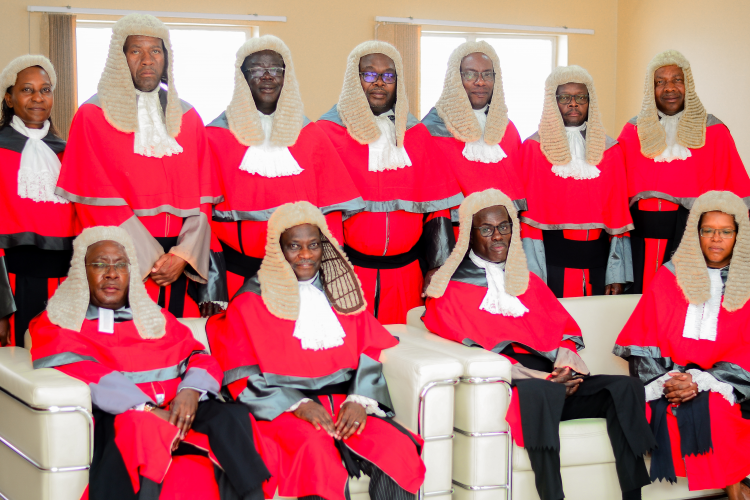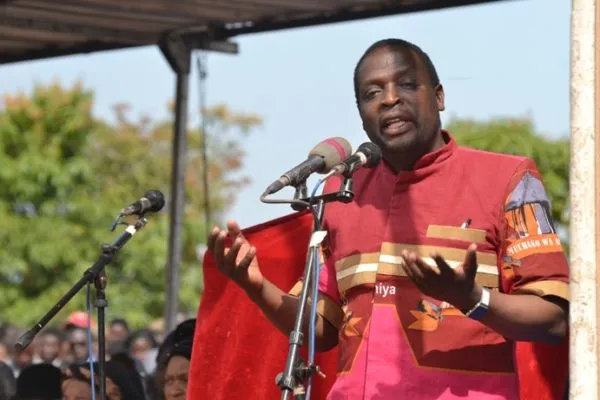A group of fired FDH Bank employees sued for illegal dismissal. While fighting for justice, a crucial court document suddenly –mysteriously –vanished from a case file at the Supreme Court of Appeal. One of the judges at the court opined that the appeal should proceed without the missing paper. But the other justices said no. JOSEPHINE CHINELE In 2015, FDH Financial Holdings, owned by one of Malawi’s richest people, Thomson Mpinganjira bought the majority shareholding (75 percent) stake in Malawi Savings Bank (MSB) from the government. The merger was completed in 2016, resulting in the integration of the two banks. Massive retrenchments followed in the two financial institutions. The dismissal of the workers prompted some to take legal action, demanding compensation for unfair dismissal. But since 2016, the former employees have faced frustration in their quest for justice amid allegations of judge shopping, tampering with case files at the country’s higher courts, and contradictory judgments by the country’s most senior judges. Through court documents, and interviews with the concerned parties, their lawyers, and independent lawyers, PIJ now tells their story. ⇼⇼⇼⇼⇼⇼⇼⇼⇼⇼⇼⇼⇼⇼⇼ At the time the former FDH employees launched their court case, there was every reason for them to be optimistic, or at least one good reason. The Industrial Relations Court (IRC) through its Deputy Chairperson Anneline Lidamlendo had just ordered the FDH Bank to partially pay off a group of former employees of the MSB, the bank acquired by FDH, for unfair dismissal. “If employees of MSB were compensated, we also believed we had a clear straightforward case,” recalls one of the former bank workers, speaking anonymously for fear of reprisals. Immediately after the redundancies, the employees applied for a High Court injunction. But while acknowledging the workers had grounds to lodge a case for unfair dismissal, Justice Maclean Kamwambe declined the application in a July 2016 ruling, advising the workers to sue for unfair dismissal instead and recommending their compensation. “The Court can’t force an employer to continue in a sound relationship with the employee, when the employer knows that he is to pay compensation, even by special award under the Employment Act,” ordered Justice Kamwambe. But while waiting for the commencement of the substantive case for unfair dismissal, the long exchange of judges handling the case began. The case was reassigned to Justice Rowland Mbvundula who in turn referred the matter to the IRC. It took the Industrial Court four years to issue a ruling in the matter. The ruling was in favor of the fired employees. “The Respondent (FDH Bank Limited) in view of all discussion above, unfairly terminated the services of those applications from middle management and below, therefore only those Applicants fitting those posts are entitled to compensation for unfair dismissal,” ruled Anneline Lidamlendo of the Industrial Relations Court of Malawi in August 2020. But this was just part of the long legal battle between the fired employees and the bank. FDH appealed the IRC determination at the High Court. Justice Dingiswayo Madise, then a High Court judge, was assigned the case but FDH lawyers protested his appointment on the basis that Madise was one of the judges presiding over the 2019 presidential election case who were now witnesses in a case against FDH founder and main shareholder Thom Mpinganjira in a bribery case he was accused of attempting to bribe judges of the Constitutional Court. FDH founder and main shareholder Thom Mpinganjira Justice Mandala Mambulasa was appointed to take over the case. But again FDH Bank lawyers were not comfortable that Mambulasa heard the case. They argued that at some point Mambulasa was one of the directors of MSB which merged with FDH. Later Justice Jack Nriva presided over the matter. The judge overruled the IRC, ruling that the former bankers should be compensated. Not satisfied with the High Court ruling, the complainants took the matter to the Supreme Court of Appeal. A leave of appeal, which certifies the highest court in the land to hear a case was issued. ⇼⇼⇼⇼⇼⇼⇼⇼⇼⇼⇼⇼⇼⇼⇼ As the parties waited for the big day in court, unknown to the workers, something with ramifications for the future of the appeal case had happened. The former employees allege that even before the discovery of the missing Leave of Appeal document from the court case file, a whistleblower from the court had phoned one of them with a word of caution. “He said he had information that money was exchanging hands that our case should be dismissed,” a former employee told PIJ. The employees also alleged certain judges on the panel that eventually settled the matter had social ties to key figures in FDH. (PIJ could not independently verify the validity of both allegations while FDH bank denies any wrongdoing or flouting any procedures in the case.) Lawyer Shepher Mumba, who represented the workers, noted that the leave of appeal he had filed was missing. According to Court records, Mumba noticed the missing document two weeks before appearing in the Supreme Court of Appeal, while preparing for the case. Other related documents had also vanished from the case file. They were not in the Supreme Court electronic system either. Faced with the grim reality, Mumba produced a new set of documents and upon explanation to the court, Justice Dorothy nyaKaunda-Kamanga, one of the justices of the Supreme Court, ordered that the appeal could go ahead as the evidence clearly showed the lawyers for the former FDH Bank employees had properly filed the documents only for them to go missing at the court. “This is a proper case where this court should exercise its discretion in favor of the applicants. In the circumstances, the application for enlargement of time to appeal is hereby allowed to afford the applicants an opportunity to prosecute the appeal to its logical conclusion,” ordered the judge. If the employees jubilated, it's because they had no idea it would be a short-lived justice. But a panel of seven Justices of Appeal who are Lovemore Chikopa (who was chair of the panel of judges), Frank Kapanda, Healey Potani, John Katsala, Silvester Kalembela, Dingiswayo Madise, and Rowland Mbvundula dismissed the matter on technical grounds, citing a missing leave of appeal document. “In the circumstances, this court does not have a competent appeal before it, and the matter is dismissed. We make no order in respect of the costs and will get from the Registrar’s office a typed order along these lines,” ruled the judges, according to a court record of the ruling made on 24 January 2023, seen by PIJ. Acting Registrar of the High Court and Supreme Court of Appeal, Innocent Nebi confirmed that the case was dismissed due to the absence of a competent appeal before the Supreme Court of Appeal. “Be advised that the file for the case/record is not missing. The appeal was dismissed because there was no leave/permission to appeal before a notice of appeal was filed in the Supreme Court. Since there was no competent appeal before the Court it was dismissed,” he told PIJ through the messaging platform, WhatsApp. FDH’s legal team however insisted the case was not dismissed on the technicality of the missing leave of appeal. “From what we know, it is not correct that the case was not heard due to a missing or stolen document. The case was actually heard by seven judges of the Supreme Court of Appeal who dismissed the case for the Appellants’ lack of adherence to procedural justice,” FDH’s lawyer in the matter, Alfred Majamanda told PIJ. Compounding the problem –and sense of injustice for the former employees–is the fact that no formal written ruling was produced by the panel of seven Supreme Court justices. “The judges dismissed the case orally but we have struggled to get a written judgment which is not yet out, over two years later. We are living in fear because it seems the system is following whoever is following up on this issue,” another former FDH employee told PIJ. In March 2024, the employees penned the Supreme Court Registrar requesting a written copy of the judgment to no avail. ⇼⇼⇼⇼⇼⇼⇼⇼⇼⇼⇼⇼⇼⇼⇼ Allegations of judge shopping, and theft of documents in case files are hardly new for the Malawi judiciary. In January 2018, Justice Esmie Chombo, then judge president at the Lilongwe High Court registry reported to the Malawi Law Society incidents of some lawyers paying court staff to “misplace or destroy court files to frustrate case proceedings”. Another judge, Justice Anaclet Chipeta, now retired, also publicly cited the theft of documents as one of the impediments to the delivery of justice. To date, no official criminal investigation has been conducted to probe the allegations. However, while reporting on this matter, PIJ interviewed several lawyers who confirmed the criminal practices continue. The Judicial Service Commission (JSC) refused to comment on questions presented to them by PIJ, saying the matter was outside its mandate. “We only handle complaints against judicial staff. If someone has complaints against judicial staff in relation to corruption and delays in justice, they are free to come forward,” said JSC Secretary, Irene Chikapa. The scrutiny over the judiciary’s conduct has only intensified recently after lawyer Alexious Kamangila launched a social media-driven crusade against alleged corruption in the judiciary. That campaign has culminated in official inquiries to investigate alleged widespread abuses by senior judges and support staff. Both the JSC and the Malawi Human Rights Commission (MHRC) are conducting separate inquiries. “The court system operates on trust, where such is in question, it undermines the very fabric of the social contract between the masses and the Judiciary as the duty bearer of protecting, interpreting and enforcing the law as envisaged in the Constitution,” Kamangila told PIJ. Kamangila condemned the judiciary for its lack of accountability and called for reforms to modernize the judiciary including digitisation of the filing system. “A simple system with email-based electronic filing would make a big difference. But corruption prevents such advancements because tampering with court documents is a lucrative business for certain individuals in the judiciary,” he added. ⇼⇼⇼⇼⇼⇼⇼⇼⇼⇼⇼⇼⇼⇼⇼ When FDH bank terminated the employment of the employees, there was promised support, including entrepreneurship training, to navigate through the anticipated tough times ahead. Yet, amid the employees’ long wait for justice, the employees say they have gone through hell. “It’s been a tough life since the retrenchment. Most of us haven’t been able to secure employment again. It’s hard for one to get employment after working in the banking sector even though the reasons for leaving are redundancy like in our case. We were hopeful that the courts would help us but here we are, grounded,” another former FDH employee told PIJ. CORRECTION: THIS ARTICLE WAS AMMENDED ON 23RD JANUARY 2024 TO CORRECT THE FACT THAT JUSTICE DINGISWAYO MADISE DID NOT RECUSE HIMSELF FROM HEARING THIS CASE WHILE HE WAS A HIGH COURT JUDGE. THE FACT OF THE MATTER IS THAT THE CASE WAS ASSIGNED TO HIM BUT FDH LAWYERS PROTESTED HIS APPOINTMENT HENCE IT WAS ASSIGNED TO ANOTHER JUDGE. READ MORE: CITIZENS STUNNED: LAWYER SECRETLY FILES COMPENSATION CLAIMS WITHOUT CONSENT CROSS-JURISDICTION CONTROVERSY: MAGISTRATE’S AUTHORITY QUESTIONED IN PSI FRAUD CASE KEEPING THE LID ON MALAWI’S TEA PLANTATIONS ROAD ACCIDENT VULTURES SPINNING MONEY ON THE ROADS AND MORGUES ………………………………………………………………………………. This article was produced by the Platform for Investigative Journalism (PIJ), a non-profit and public interest centre for investigative journalism. ABOUT AUTHORS: Josephine Chinele is an award-winning investigative journalist working with PIJ and previously worked for Times Group. Her reporting on bullying at the Kamuzu University of Health Sciences (KUHeS), a public university, prompted an official inquiry that validated her reports. THE LAWYERS AND A LITANY OF DUBIOUS CLAIMS: INSIDE STORY OF HOW MALAWIAN LAWYERS EXPLOITED CONFORZI PLANTATIONS THROUGH FALSE INJURY CLAIMS





.jpg)


